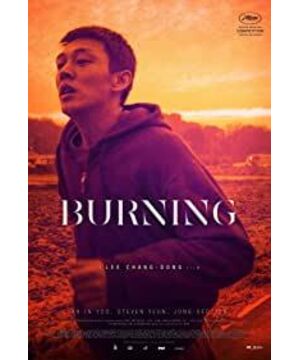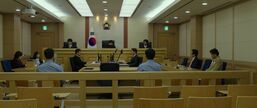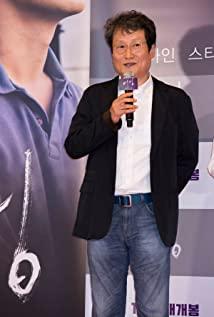"Burning" is the work of the famous Korean director Li Changdong eight years later. It is adapted from the short story "Burning the Barn" by Murakami Murakami. Murakami's novels were once regarded as the most difficult works to adapt, characterized by the sense of alienation between people and the loneliness of life in the works. This time, Li Cangdong's adaptation not only preserves the loneliness and indistinguishability between reality and reality in Haruki Murakami's works, but also injects his attention to Korean society and history into it, depicting a Korean society with a huge gap between the rich and the poor, and young people's heartache. . The purpose of this article is to take the film as an entry point from the perspective of cultural studies, and through a close reading of the text, to explain the current situation of Korean society and the psychology of young people revealed by the film.
1. Comparison of the gap between the rich and the poor
Li Cangdong, who was transformed from a writer, has always been praised as "rich literature in his works", and that comparison can be regarded as his favorite rhetoric. But unlike the deliberately forceful before-and-after contrast in "Mints", in "Burning", Li Cangdong hides the contrast in the deliberately plain plot, in a large number of long shots, and in the blank lines between the lines. This contrast makes the final effect, although not as shocking as the "complaint" in "Mints", it is closer to real life. In fact, the gap between the rich and the poor in South Korea is also growing in the daily reality, which is as long and dull as reality. Especially after the financial crisis in 2008, its data shows that the average income of farmers is 32.121 million won, and only urban households are. 66.8% of average income. In 2005, this figure was only 78.2%. Taxes show that the top 20% of salary earners collectively account for 41.6% of the overall salary, which means that the top 20% take nearly half of the pie.
At the beginning of the film, the living environment of Zongxiu and Huimei is quietly shown. They are fellow villagers from the same place, and they are still in the same class, so we didn't seem to notice any problems until Ben appeared. He was obviously a friend who shared adversity and travels abroad. After returning to China, he had a brand-new BMW on the one hand and a tattered and rusted truck on the other. The driver of the Ben car joked, "It takes several times to brake when you step on the accelerator. ”, the discordant contrast begins.
Zong Xiu once praised Huimei's crowded and chaotic small room. Although there is only fake sunlight shining in one day, it is at least better than his house with "the toilet is next to the dishwasher", but her room is not even as big as Ben's kitchen; The environment they grew up in is even more different. One is the Jiangnan area full of high-end restaurants and cafes, and the other is the countryside near the 38th line. Every day, you can hear the big decibel inspiration from North Korea, and cows are floating in the air. The smell of feces; Zongxiu and Huimei work very hard, but one is full of debts, and the other is barely making ends meet. On the other hand, Ben, on the other hand, seems to be partying, cooking, and living a leisurely life all day long.
In fact, the huge gap between the rich and the poor has also become the driving force for the film's internal development. Although the characters Zongxiu and Huimei in the film are not as proactive as ordinary people like the commercial films we usually watch, but It's not that young people don't question the reasons behind this and don't want to work hard to become rich. Zongxiu dreams of becoming a writer, while Huimei pursues a great hunger, always waiting for the day when they "burn". But in the face of the huge uneven distribution of social resources, the efforts of young people are so insignificant and useless, so the whole film presents a descending sense of emptiness.
2. Hidden class solidification
Also hidden in the film are the positive reasons behind the gap between the rich and the poor. Even the director borrowed Zong Xiu's words to say, "These young people are so rich now that they don't know what they are doing." Zong Xiu asked Ben's occupation many times, but Ben only vaguely said, "Speaking of you too. I don't understand" and "It's almost like traveling". TV will only report "the economy is down, young people are unemployed". It seems that we still can't tell what is the reason behind such an obvious resource gap, and how young people can work hard to change the status quo.
I think the role of Zong Xiu's father actually hints at the director's answer. When Zong Xiu's father signed the petition to the villagers, the villagers once introduced Zong Xiu to this father who he was not even familiar with, "If your father used The money earned by foreign workers was invested in Jiangnan to buy a small house, and he had already sent it. But he refused to listen and insisted on returning to his hometown to engage in animal husbandry.” As Chinese people, we should have a deep understanding of the hint in this line. The wealthy upper class at this stage may not have anything special, but they just happened to stand on the wind and bought a suite at the right place and the right time. However, in today's economic downturn and class solidification, a choice made by the predecessors has created a gap that makes young people work hard all their lives to make up for the gap. The generation of Zong Xiu and Huimei can no longer enjoy the opportunity to earn money to change their class by working abroad like their parents for a few years.
What's even more frustrating is that not only in terms of economic breakthroughs, but this kind of class solidification is even subtly increasing the gap between the rich and the poor. As we say, "Poverty limits our imagination." , wealth gives the youth of the upper class better qualities, but poverty limits the vision of the youth of the lower class. Compared with Zongxiu, who is inferior and shy, Ben is always cheerful, generous and polite; compared to Huimei, who sometimes acts inappropriately, he has a wide range of friends and can be integrated into any circle. The novelist Zong Xiu cherishes and loves the most, a symbol of his literary ideals, was "stolen" by Ben to study and read the next time they met.
The road from the lower class to the upper class is gradually closing, while the upper class can so easily take everything that the lower class holds dear. Just like Ben's sarcastic and indifferent smile when Zongxiu once angrily told Ben "I like Huimei", class solidification makes young people's anger like a punch on cotton, which is useless.
3. Is burning the answer to life?
Li Changdong once said in an interview that he made the film because he wanted to know why young people are always so angry. But from the perspective of the finished film, anger and burning are actually only temporary states, and the emptiness we are familiar with occupies more of the young people in the film. Just like the real world we are familiar with, the huge gap between the rich and the poor and the hard-to-change class solidification, let young people live in Japan, let young people Buddha in my country, how can young people in South Korea burn alone?
Like Zongxiu, he was always busy with blank faces, empty eyes, no friends around, and a cold relationship with his father. It was not until Huimei broke into his life that it brought him a little vitality. Vitality makes him constantly think about it, even feeding the cat every day and jetting out of the window; Huimei, who seems to be active all the time, fills her life with travel, love, sex, and drugs, and asks for the meaning of life, but in fact She was heavily in debt and was ordered not to go home by her mother, and it was easy to fall in love. Her life was just like the oranges she pretended to exist when she acted in pantomime. In fact, she was extremely deficient both materially and spiritually. Even Ben, who seems to have everything, seems to be living freely in the world, but in fact he always yawns during the conversation of his friends, drives himself to the lake in the suburbs, and can only stimulate himself by "burning the greenhouse" .
"Greenhouse" in Ben's mouth is undoubtedly the representative of the lower class. The cosmetics and souvenirs in the bathroom, as well as the cat called the boiler, seem to imply that he takes pleasure in slaughtering the lower class, which is his life. The only burning moment in the show; Hye Mi took off her top after she got high, and danced the great hunger dance with her hands up to the sky under the Korean flag, as if she suddenly realized the meaning of life at that moment, this is her life Zong Xiu finally burst out with the anger that accumulated throughout the film, against the cruel and ruthless Ben, against the injustice of the rich and the poor in society, and finally killed Ben and ignited his sports car to destroy his corpse. Mei danced naked, and it was the burning moment of his life. Through these burning moments, they all seem to have briefly found the joy and meaning of life beyond wealth, society, and class, but then what? Is this the answer to life?
When one greenhouse burns out, Ben will surely find the next one to ignite; when the "Big Hunger" dance is over, Hui Mei still has to put on clothes and sit in Ben's co-pilot, being called a bitch by Zong Xiu; when anger erupts When it was over, Zong Xiu still had to jump into the tattered truck and turn on the air conditioner to keep warm.
The burn is so short-lived that it doesn't actually change anything. It's only you that burns, not other people or this fucking society. After you burn, the upper class is still the upper class, and the lower class is still the lower class. What's even sadder is that you haven't sacrificed heroically and liberated yourself in the flames, but watched the flames go out, and then fell into the darkness where you could clearly hear your own breathing, feeling the infinite emptiness that followed. Director Li Cangdong might as well use the experience of making this film as an adventure to explore the hearts of young people.
View more about Burning reviews











